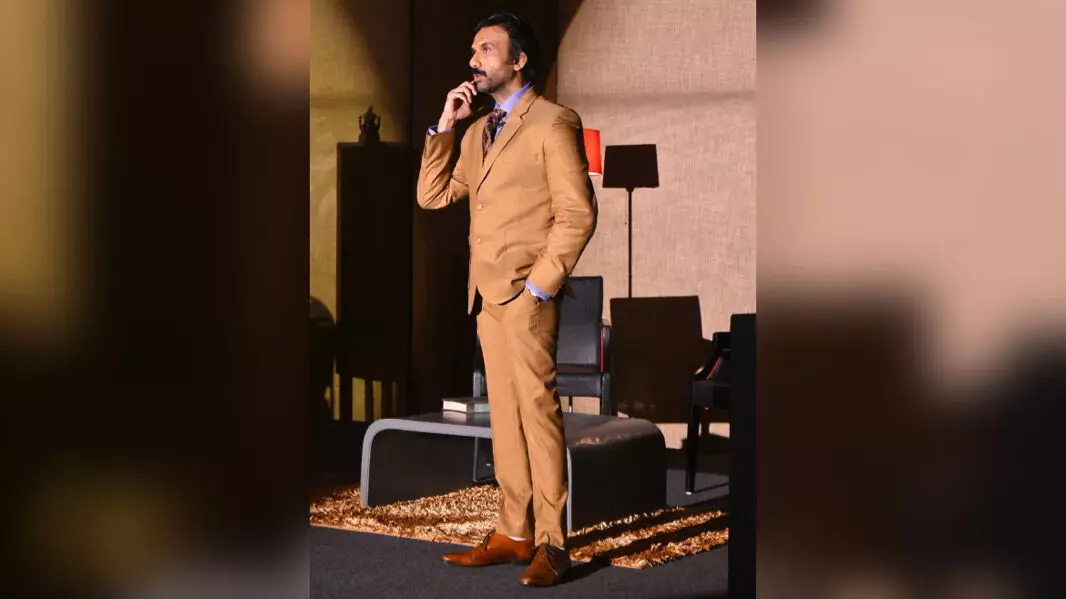`Sunset-Sunrise’: How Qadir Ali Baig Theatre Foundation’s play took audience down memory lane
41st anniversary of Hyderabad’s theatre legend Qadir Ali Baig and 20 years of Qadir Ali Baig Theatre Foundation was celebrated with the play ‘Sunset-Sunrise’
By Kaniza Garari
`Sunset-Sunrise’: How Qadir Ali Baig Theatre Foundation’s play took audience down memory lane
Hyderabad: As twilight draped the city of Hyderabad in golden hues, the stage at Radisson Blu came alive with a story that mirrored the soul of countless Indian homes. “Sunset-Sunrise,” the evocative play staged by the Qadir Ali Baig Theatre Foundation, unfolded not merely as a performance—but as a shared memory, a collective ache, and ultimately, a tender embrace of change.
The evening was more than just a cultural gathering—it marked 41 years of the enduring legacy of theatre doyen Qadir Ali Baig and 20 years of the foundation founded by his son, Padma Shri Mohammad Ali Baig, who continues to elevate Indian theatre with deeply resonant, contemporary narratives.
A distinguished audience had gathered for the occasion, reflecting the city’s cultural and civic heartbeat. In attendance were Air Marshal Manek Madon and Yasmin Madon, Anil and Seema Kumar, Anuradha Reddy and IAS officer Ajay Mishra, Bhupinder and Brij Sahney, Col. S.K. and Shopna Obheroi, M. Taher, former Director of the Archaeological Survey of India, Raunaq Yar Khan, Suket Gujral, and Shilpa Jain with a guest. The gathering also included prominent figures such as Tareq Ansari, Chairman of the Telangana State Minorities Commission (TSMC), A.K. Khan, former DGP, and Omar Soofi—all coming together in shared appreciation for theatre’s power to tell the stories of our times.
The Empty Nest with Wi-Fi
At the heart of the play is a mother, portrayed soulfully by veteran actress Rashmi Seth, who takes the audience by the hand and walks them through the seasons of her life—from a young bride in a bustling Indian joint family to a quietly resilient woman navigating solitude and Skype calls.
In a home where laughter once echoed off kitchen walls and cousins fought over mangoes, silence has grown louder. Her only son, sent abroad to chase the elusive dollar dream, is now a distant voice crackling through video calls and text messages. She learns to click, scroll, and search—stumbling at first, then soaring—as technology becomes her unlikely companion.
Seth’s performance is a masterclass in subtlety, layered with warmth, wit, and the ache of maternal love. She makes the audience laugh, sigh, and sometimes blink back tears as she clutches a phone like a lifeline, learning slowly that even sunset years can hold the promise of sunrise.
A Son Across Oceans
Mohammad Ali Baig, stepping into the role of the son in the U.S., delivers a quietly powerful portrayal of the classic Indian conflict: duty versus desire. Pushed into becoming a computer engineer, his dreams of becoming an athlete lie buried under spreadsheets and school runs. Between childcare and career climbs, he becomes a ghost to his own past, constantly reaching for the life he left behind in India.
His internal turmoil is not exaggerated—it’s intimate and familiar. Baig shows us the weariness of a generation caught between success and sacrifice, one video call away from guilt.
The Father, The Foundation
Though he has limited stage time, Vijay Prasad as the father—once a stoic government officer—is the emotional spine of the story. In his quiet strength, he embodies a generation of men who measured love in responsibilities, not in words. His role, though brief, reminds us of the men who sacrificed silently to build the scaffolding of their children’s futures.
The Twist—and the Triumph
The play culminates in a surprising yet stirring climax: the mother, once overwhelmed by passwords and pop-ups, reinvents herself. She blends tradition with tech and breathes new life into the family business. It’s not just a moment of personal victory; it’s a message—poignant and powerful—that adaptation is ageless.
Her son, thousands of miles away, is left speechless—not by her transformation, but by the realisation that love doesn’t wait. It evolves.
60 Minutes of Grace and Grit
In just one hour, Sunset-Sunrise captures what volumes of prose may fail to: the silent heartbreak of separation, the quiet strength of parents, and the deep desire to stay connected—not just through screens, but through shared effort and empathy.
More than a play, it was a mirror held up to modern India—where WhatsApp groups have replaced family dinners, and digital literacy is the new survival skill for our elders. And yet, hope flickers on stage, as it always does, where theatre meets truth.
As the curtain fell to a standing ovation, the message lingered like the warmth of twilight: even in sunset years, the sun can rise again—if we only dare to log in, reach out, and never stop learning.